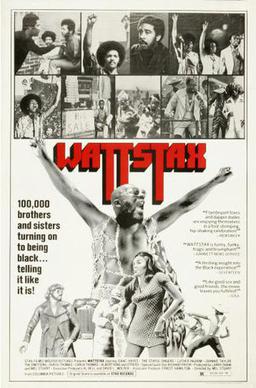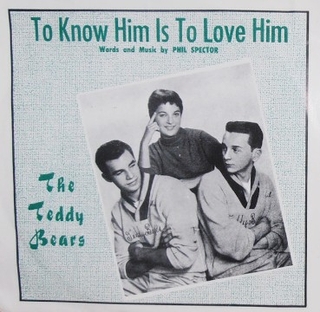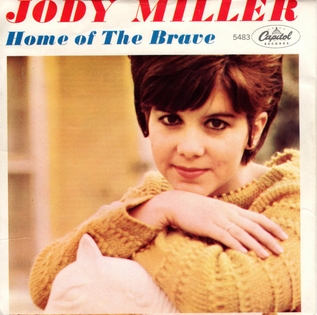Other uses
- Home of the Brave (play), a play by Arthur Laurents
- Home of the Brave (radio program), an American radio program broadcast on CBS
"Home of the Brave" is the ending phrase from the United States national anthem "The Star-Spangled Banner". It may refer to:

"The Star-Spangled Banner" is the national anthem of the United States. The lyrics come from the "Defence of Fort M'Henry", a poem written by American lawyer Francis Scott Key on September 14, 1814, after he witnessed the bombardment of Fort McHenry by the British Royal Navy during the Battle of Baltimore in the War of 1812. Key was inspired by the large U.S. flag, with 15 stars and 15 stripes, known as the Star-Spangled Banner, flying triumphantly above the fort after the battle.
"God Bless America" is an American patriotic song written by Irving Berlin during World War I in 1918 and revised by him in the run-up to World War II in 1938. The later version was notably recorded by Kate Smith, becoming her signature song.
The Saint may refer to:
Zero Hour may refer to:
A revolution is a drastic political change that usually occurs relatively quickly. For revolutions which affect society, culture, and technology more than political systems, see social revolution.
Reflections may refer to:

Luiz Floriano Bonfá was a Brazilian guitarist and composer. He was best known for the music he composed for the film Black Orpheus.

Wattstax was a benefit concert organized by Stax Records to commemorate the seventh anniversary of the 1965 riots in the African-American community of Watts, Los Angeles. The concert took place at the Los Angeles Memorial Coliseum on August 20, 1972. The concert's performers included all of Stax's prominent artists at the time. The genres of the songs performed included soul, gospel, R&B, blues, funk, and jazz. Months after the festival, Stax released a double LP of the concert's highlights, Wattstax: The Living Word. The concert was filmed by David L. Wolper's film crew and was made into the 1973 film titled Wattstax. The film was directed by Mel Stuart and nominated for a Golden Globe award for Best Documentary Film in 1974.
Brave New World is a 1932 novel by Aldous Huxley.
A home is a place of residence. In real estate usage, new or unoccupied dwelling units are often euphemistically called "homes" even though no one lives there.

"Baby I'm Yours" is a song written by Van McCoy which was a hit in 1965 for Barbara Lewis, the original recording artist.

Myrna Joy "Jody" Miller was an American singer, who had commercial success in the genres of country, folk and pop. She was the second female artist to win a country music accolade from the Grammy Awards, which came off the success of her 1965 song "Queen of the House". By blending multiple genres together, Miller's music was considered influential for other music artists.
Ned Kelly (1854–1880) was an Australian bushranger, outlaw, gang leader and convicted police murderer.

"To Know Him Is to Love Him" is a song written by Phil Spector, inspired by the words on his father's gravestone, "To Know Him Was to Love Him". It was first recorded by the only vocal group of which he was a member, The Teddy Bears. The single spent three weeks at No. 1 on the Billboard Hot 100 chart in 1958, while reaching No. 2 on the UK's New Musical Express chart. Peter & Gordon and Bobby Vinton later each experienced chart success with the song, in 1965 and 1968, respectively.
Going Home or Goin' Home may refer to:
Breakout or Break Out may refer to:
Janice Gadsden Pendarvis is an American singer, songwriter, and voiceover artist. She has worked with artists such as Sting, David Bowie, Steely Dan, Peter Tosh, the O'Jays, Philip Glass, Jimmy Cliff, Laurie Anderson, the Naked Brothers Band, and the Rolling Stones.
"Bring Him Back Home (Nelson Mandela)", also known as "Bring Him Back Home", is an anthemic anti-apartheid protest song written by South African musician Hugh Masekela. It was released as the first track of his 1987 album Tomorrow. It was recorded in 1986 when Masekela was in exile from the apartheid regime of South Africa. The melody of the song is buoyant, containing a number of powerful chords and trumpet riffs. The lyrics of the song demand the release of Black South African leader Nelson Mandela, who had been imprisoned by the White South African government on Robben Island since 1962. The song became enormously popular, and turned into an unofficial anthem of the anti-apartheid movement. It became one of Masekela's most performed live songs. It was later used as a part of the official soundtrack to the documentary film Amandla!: A Revolution in Four-Part Harmony. The song was included in the 1994 live album Hope and in the 2001 collection Grazing in the Grass: The Best of Hugh Masekela, released by Columbia Records.

"Home of the Brave" is a song recorded and made successful by American singer Jody Miller. It was composed by songwriters Barry Mann and Cynthia Weil. Released as a single by Capitol Records in 1965, "Home of the Brave" reached the pop charts in the United States, Canada and Australia. It was characterized as a protest song for its discussion of social issues during the sixties decade. It was among Miller's most commercially successful recordings in her career despite being banned from radio stations. "Home of the Brave" was released on an album of the same name in 1965.

Home of the Brave is a studio album by American singer Jody Miller. It was released in October 1965 via Capitol Records and contained 11 tracks. The material mixed pop with country songs. Its title track reached the pop charts in several countries including Australia, Canada and the United States. The disc was Miller's third studio album in her career and received a positive review from Billboard following its release.